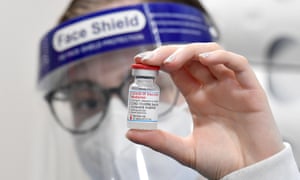
Here’s more on that mRNA deal the federal government has finalised with Moderna.
Vaccines will be produced in Melbourne from 2024, but construction on the new factory could still be 20 months from starting and no site has yet been chosen for the cutting-edge facility.
Prime minister Scott Morrison had announced an in-principle agreement with the Texan company in December. Today’s announcement is the finalisation of that process, confirming the partnership between the federal and Victorian governments with Moderna.
The federal government said the facility would have the capacity to make up to 100m doses a year, including vaccines for Covid, influenza and other respiratory diseases.
In December, when announcing the in-principle agreement, the Victorian government said 100m would be the top capacity that it could “scale up” to in a future pandemic, but that the normal annual production would be 25m vaccines.
Morrison’s office said construction on the factory would begin before the end of 2022, ahead of production beginning from 2024. The PM said it would be “the first mRNA production facility in the southern hemisphere”.

The process of site selection is the subject of “negotiations” between Moderna and Victoria. Industry department officials told a Senate hearing in July 2021 that they were still choosing between retrofitting an existing factory, or building a new site.
It’s also yet to be announced how much the facility will cost, and how much taxpayers will contribute. In December, Morrison and then-acting premier of Victoria James Merlino said the financial details were “commercial in confidence” and “sensitive”.
Morrison said the facility would create 500 jobs in construction, and employ around 150 people once completed.
Health minister Greg Hunt said the onshore production of mRNA vaccines would be “crucial insurance” for the health of Australians. Australia currently has no local mRNA production capability, which led to supply issues during the initial phases of the Covid jab rollout and questions being raised over the Coalition’s strategy around ordering vaccines.
“It means Australians will have access to the most cutting-edge vaccination technology available both now and into the future,” Hunt said.
Moderna’s Australian arm called it a “landmark” deal, promising a “world class” mRNA industry onshore and pledging to work closely with local researchers on new medical developments.


